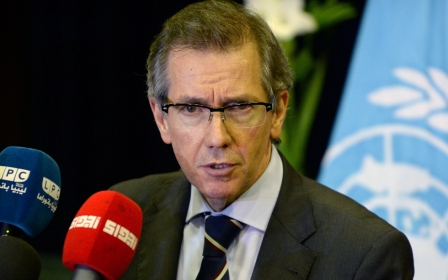Serbian embassy staff killed in US strike in Libya

BELGRADE - Two Serbian embassy staff kidnapped by the Islamic State (IS) group in Libya have been killed in a US airstrike, Serbian Prime Minister Aleksandar Vucic confirmed on Saturday.
The news of their deaths began to emerge through late on Friday after the US launch a raid on an IS training camp, reportedly killing at least 49 IS militants. It is believed that Noureddine Chouchane, a senior Tunisian IS operative who has been linked to the large-scale terrorist attacks in Tunisia last year, was the main target although authorities have yet to confirm this.
Serbian Embassy communications chief Sladjana Stankovic and her driver, Jovica Stepic, were abducted by IS near Sirte in mid-November. Mixed signals about their subsequent whereabouts are now appearing.
Serbian Minister of Foreign Affairs, Ivica Dacic, told reporters early on Saturday morning that the CIA and other intelligence agencies had told his government where the hostages were being held before the strike. He said he had even been informed of the hostages’ exact location and knew which building they were being held in.
Vucic, however, appeared to deny this later on Saturday, saying that the Americans did not know where the hostages were being held.
“The most solid information we received, we got from the Spanish on 12 February,” he said. “We [then] got information about that location from the CIA and the FBI that there was no activity in that location.”
Washington has yet to make an official statement on their deaths.
“This is the first serious hostage crisis our country has faced,” Vucic told reports on Saturday after saying that he had undeniable proof that the hostages had been killed.
“I think we would have been able to pull out the abducted personnel if they weren’t killed in the bombing by the Allies.”
There is controversy over why Serbia continued to operate diplomatic missions in Libya even after most other countries pulled out due to the worsening security situation. The authorities have claimed they wanted to do so as Libya kept representatives in the country during the NATO bombing of Serbia in 1999.
Some 250 Serbian citizens still remain in Libya despite repeated requests by the Serbian authorities that they return home, Vucic said.
The foreign policy analyst and former editor of Serbia’s longest-running Politika newspaper, Bosko Jaksic, told MEE that Serbia’s participation in the US-led anti-IS coalition is extremely limited and that there will be no consequences following this incident.
"America certainly does not inform all 65 countries of the bombings it conducts. Therefore, I doubt that it informed Serbia. I don’t think that this case will cause a greater diplomatic scandal between the two countries, and it is more likely that everything will end with a diplomatic note,” said Jaksic.
He said there are many inconsistencies regarding the whole case, including the fact that Serbia kept its embassy open in Tripoli, which is controlled by the rebel forces and an unrecognised government.
“The Serbian public has only now been informed that the Serbian Embassy’s employees were kidnapped by IS. So far, the Serbian authorities claimed that it was just a deed of a criminal group,” Jaksic concluded.
Political analyst Vuk Stankovic, also told MEE that the incident was unlikely to divert Serbia from anti-terrorist coalition and NATO.
“Our country is not able to send troops into battle against IS, but we can contribute to the exchange of intelligence with other countries. I am certain that after this incident in which Serbian civilians were a collateral damage, the exchange of operational intelligence will be highly intensified,” concluded Stankovic.
Serbia controversially ratified an "Individual Partnership Action Plan" with NATO on 12 February, despite remaining tensions over the 1999 NATO bombing of Serbia over the latter's actions in Kosovo. Ratification of the agreement is expected to impact Serbia’s relationship with Russia, a traditionally close Serbia ally.
Stay informed with MEE's newsletters
Sign up to get the latest alerts, insights and analysis, starting with Turkey Unpacked
Middle East Eye delivers independent and unrivalled coverage and analysis of the Middle East, North Africa and beyond. To learn more about republishing this content and the associated fees, please fill out this form. More about MEE can be found here.




